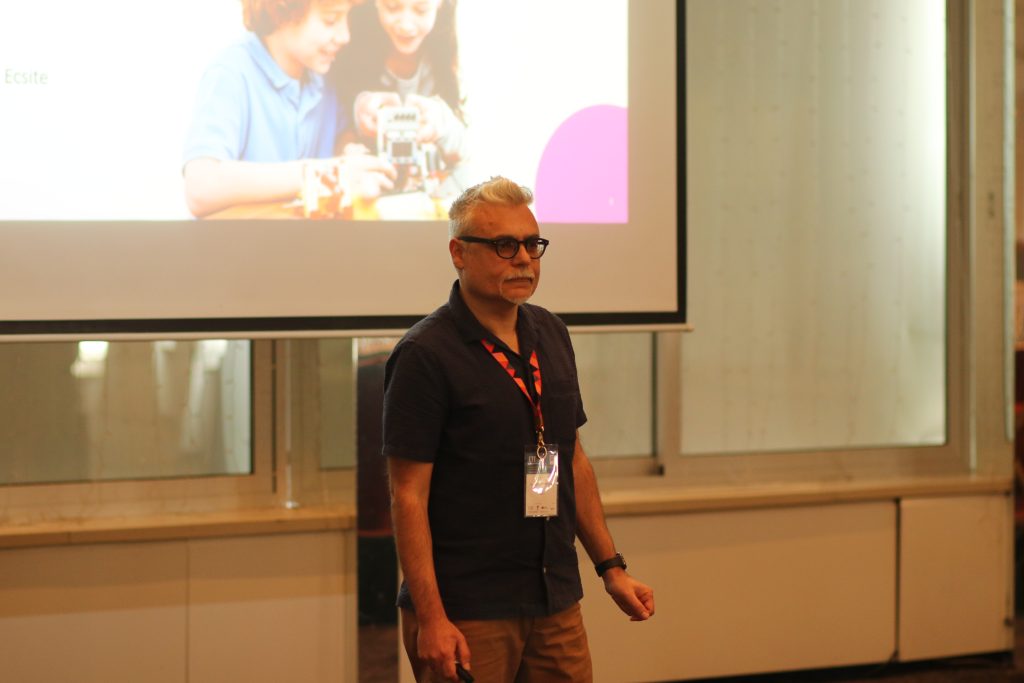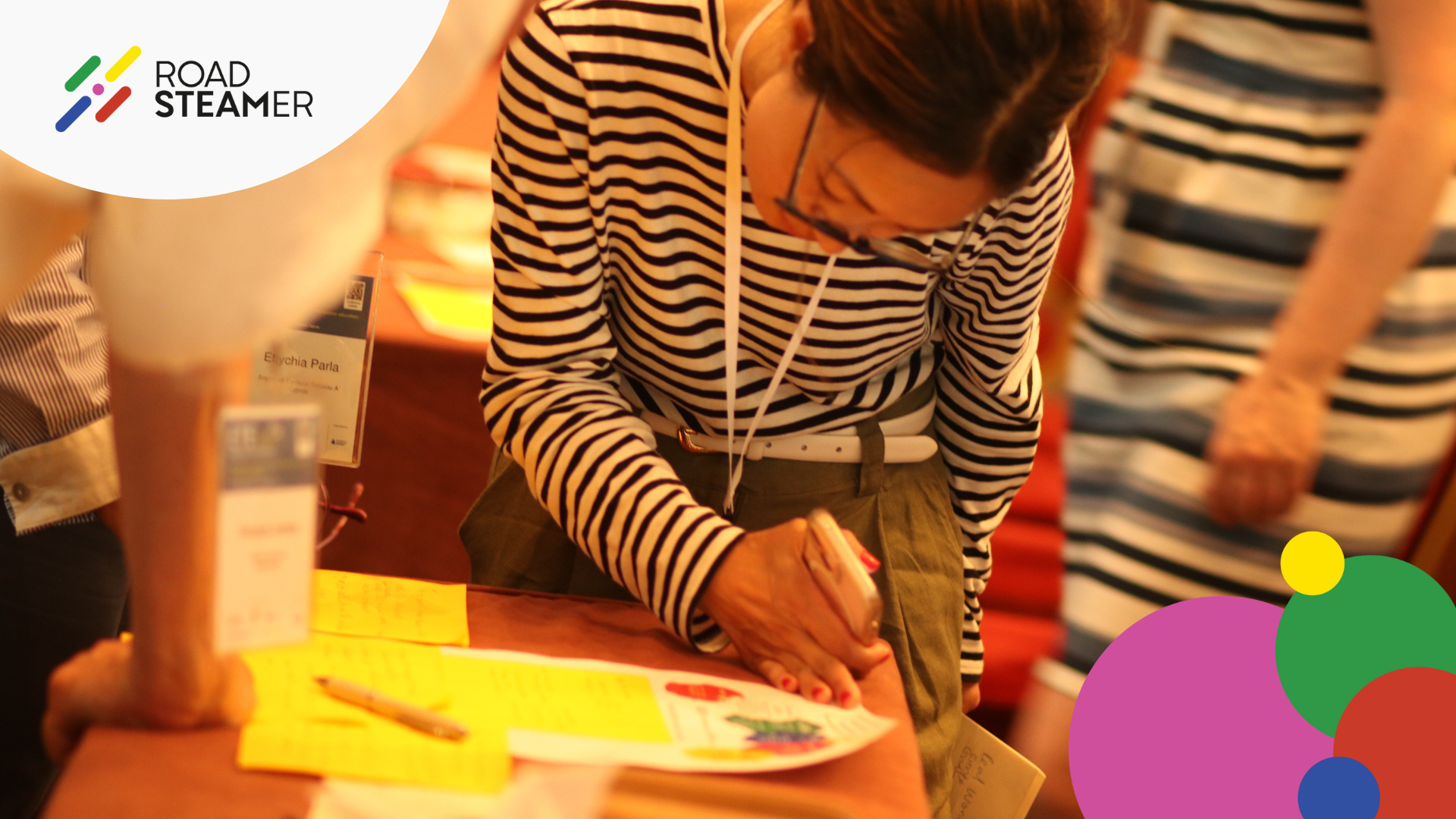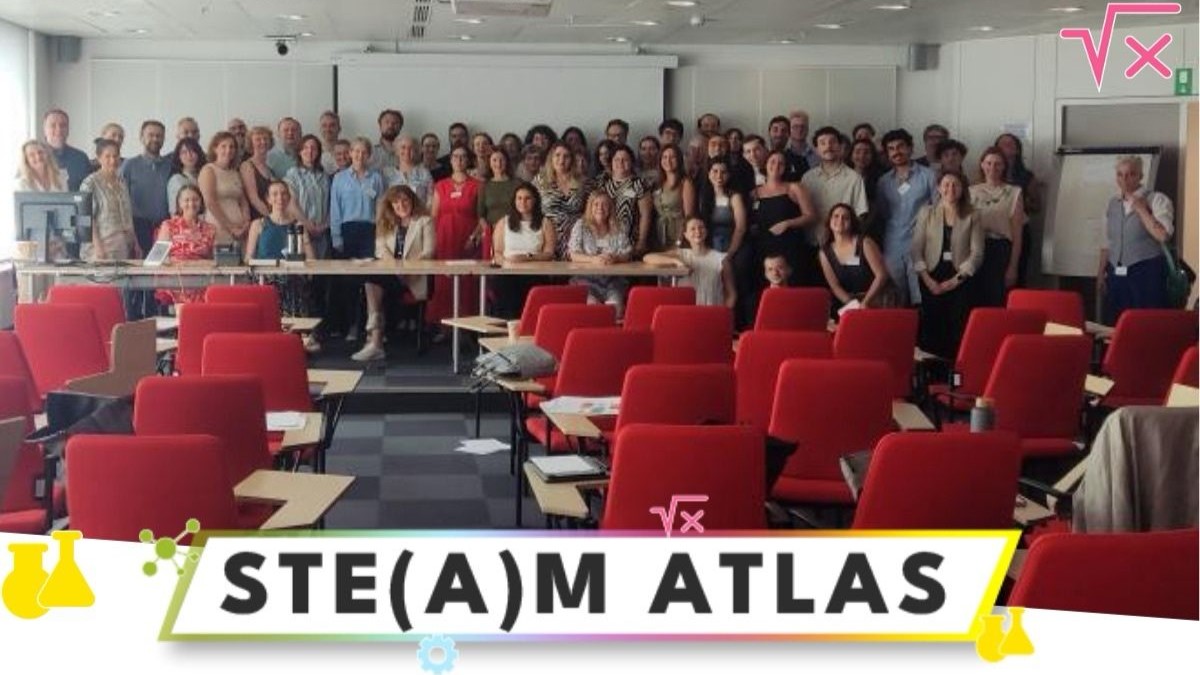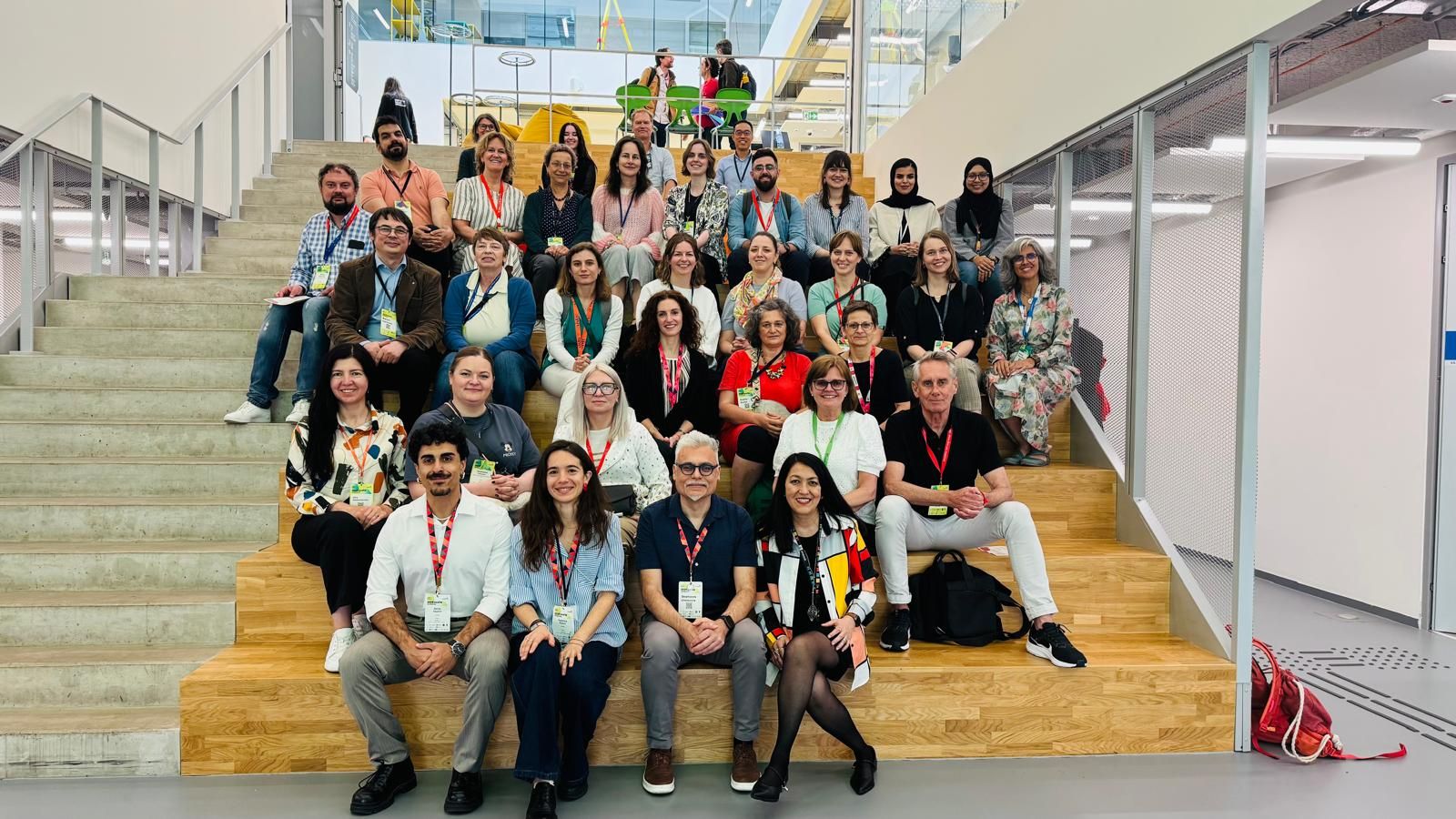The Road-STEAMer project hosted a workshop as part of the Educating the Educators (ETE) conference in Cyprus, entitled “From Criteria to Practice: Co-Creating Sustainable STEAM Learning.” The session, led by Stephanos Cherouvis from Ecsite, the European Network of Science Centres and Museums, introduced participants to the six evidence-informed criteria for quality STEAM education developed within the project.
 Structured as a gallery walk, the session invited participants to engage directly with the criteria by contributing reflections and examples from their own educational contexts. This interactive format enabled educators and researchers to critically examine how STEAM learning principles translate into practice, and to explore how context-specific factors, such as school culture, available infrastructure, and external partnerships, influence implementation.
Through a hands-on group activity, participants reflected on how to avoid tokenistic engagement with real-world challenges and instead foster deeper, reciprocal collaborations between students and their communities. For example, participants discussed a case in which primary school children explored local food systems by working with restaurants and markets.
Other examples highlighted the role of local engagement in student-led investigations. Teachers shared experiences of students designing and conducting surveys to understand how climate change was affecting their own communities, or participating in health-related projects such as prototyping simple prosthetic devices. These examples foregrounded the potential of STEAM education to link classroom learning with concrete societal needs, provided there is time, support, and a collaborative approach.
The conversation also turned to disciplinary integration, a recurring challenge particularly in secondary education. Participants noted that in subject areas with strong curricular boundaries, such as mathematics, physics, or chemistry, it can be difficult to establish authentic interdisciplinary links. Nonetheless, some educators described promising approaches, such as asking students to reflect on how multiple disciplines intersect in technological innovations, or using case studies to illustrate the layered contributions of different fields. Activities such as poster design were also cited as effective tools for helping students articulate and visualise how complex systems work.
The arts were identified as a key enabler of meaning-making and reflection in STEAM learning. Several educators shared how theater, storytelling, and visual arts helped students to consolidate and communicate their understanding, particularly when working on complex topics. These practices were valued not only for their expressive potential but also for their ability to enhance knowledge retention.
The session concluded with a discussion on collaboration and active participation within project-based learning. Participants highlighted the educational value of enabling students to take on diverse roles within a team, such as designing, coding, researching, or presenting, and noted that such experiences supported both skill development and peer learning. A further theme that emerged was the importance of trust. Inclusion and empowerment, particularly for students from various backgrounds, depend on sustained trust-building between educators, learners, and external partners.
The Educating the Educators conference organised by the International Centre for STEM Education (ICSE) provided a valuable forum for exchange among STE(A)M education practitioners, researchers, and policy stakeholders. It offered opportunities not only for professional development, but also for critically reflecting on how STEAM approaches can become more inclusive, relevant, and impactful. The next edition of the conference will take place in Istanbul on 8–9 November 2025.
Structured as a gallery walk, the session invited participants to engage directly with the criteria by contributing reflections and examples from their own educational contexts. This interactive format enabled educators and researchers to critically examine how STEAM learning principles translate into practice, and to explore how context-specific factors, such as school culture, available infrastructure, and external partnerships, influence implementation.
Through a hands-on group activity, participants reflected on how to avoid tokenistic engagement with real-world challenges and instead foster deeper, reciprocal collaborations between students and their communities. For example, participants discussed a case in which primary school children explored local food systems by working with restaurants and markets.
Other examples highlighted the role of local engagement in student-led investigations. Teachers shared experiences of students designing and conducting surveys to understand how climate change was affecting their own communities, or participating in health-related projects such as prototyping simple prosthetic devices. These examples foregrounded the potential of STEAM education to link classroom learning with concrete societal needs, provided there is time, support, and a collaborative approach.
The conversation also turned to disciplinary integration, a recurring challenge particularly in secondary education. Participants noted that in subject areas with strong curricular boundaries, such as mathematics, physics, or chemistry, it can be difficult to establish authentic interdisciplinary links. Nonetheless, some educators described promising approaches, such as asking students to reflect on how multiple disciplines intersect in technological innovations, or using case studies to illustrate the layered contributions of different fields. Activities such as poster design were also cited as effective tools for helping students articulate and visualise how complex systems work.
The arts were identified as a key enabler of meaning-making and reflection in STEAM learning. Several educators shared how theater, storytelling, and visual arts helped students to consolidate and communicate their understanding, particularly when working on complex topics. These practices were valued not only for their expressive potential but also for their ability to enhance knowledge retention.
The session concluded with a discussion on collaboration and active participation within project-based learning. Participants highlighted the educational value of enabling students to take on diverse roles within a team, such as designing, coding, researching, or presenting, and noted that such experiences supported both skill development and peer learning. A further theme that emerged was the importance of trust. Inclusion and empowerment, particularly for students from various backgrounds, depend on sustained trust-building between educators, learners, and external partners.
The Educating the Educators conference organised by the International Centre for STEM Education (ICSE) provided a valuable forum for exchange among STE(A)M education practitioners, researchers, and policy stakeholders. It offered opportunities not only for professional development, but also for critically reflecting on how STEAM approaches can become more inclusive, relevant, and impactful. The next edition of the conference will take place in Istanbul on 8–9 November 2025.
 Structured as a gallery walk, the session invited participants to engage directly with the criteria by contributing reflections and examples from their own educational contexts. This interactive format enabled educators and researchers to critically examine how STEAM learning principles translate into practice, and to explore how context-specific factors, such as school culture, available infrastructure, and external partnerships, influence implementation.
Through a hands-on group activity, participants reflected on how to avoid tokenistic engagement with real-world challenges and instead foster deeper, reciprocal collaborations between students and their communities. For example, participants discussed a case in which primary school children explored local food systems by working with restaurants and markets.
Other examples highlighted the role of local engagement in student-led investigations. Teachers shared experiences of students designing and conducting surveys to understand how climate change was affecting their own communities, or participating in health-related projects such as prototyping simple prosthetic devices. These examples foregrounded the potential of STEAM education to link classroom learning with concrete societal needs, provided there is time, support, and a collaborative approach.
The conversation also turned to disciplinary integration, a recurring challenge particularly in secondary education. Participants noted that in subject areas with strong curricular boundaries, such as mathematics, physics, or chemistry, it can be difficult to establish authentic interdisciplinary links. Nonetheless, some educators described promising approaches, such as asking students to reflect on how multiple disciplines intersect in technological innovations, or using case studies to illustrate the layered contributions of different fields. Activities such as poster design were also cited as effective tools for helping students articulate and visualise how complex systems work.
The arts were identified as a key enabler of meaning-making and reflection in STEAM learning. Several educators shared how theater, storytelling, and visual arts helped students to consolidate and communicate their understanding, particularly when working on complex topics. These practices were valued not only for their expressive potential but also for their ability to enhance knowledge retention.
The session concluded with a discussion on collaboration and active participation within project-based learning. Participants highlighted the educational value of enabling students to take on diverse roles within a team, such as designing, coding, researching, or presenting, and noted that such experiences supported both skill development and peer learning. A further theme that emerged was the importance of trust. Inclusion and empowerment, particularly for students from various backgrounds, depend on sustained trust-building between educators, learners, and external partners.
The Educating the Educators conference organised by the International Centre for STEM Education (ICSE) provided a valuable forum for exchange among STE(A)M education practitioners, researchers, and policy stakeholders. It offered opportunities not only for professional development, but also for critically reflecting on how STEAM approaches can become more inclusive, relevant, and impactful. The next edition of the conference will take place in Istanbul on 8–9 November 2025.
Structured as a gallery walk, the session invited participants to engage directly with the criteria by contributing reflections and examples from their own educational contexts. This interactive format enabled educators and researchers to critically examine how STEAM learning principles translate into practice, and to explore how context-specific factors, such as school culture, available infrastructure, and external partnerships, influence implementation.
Through a hands-on group activity, participants reflected on how to avoid tokenistic engagement with real-world challenges and instead foster deeper, reciprocal collaborations between students and their communities. For example, participants discussed a case in which primary school children explored local food systems by working with restaurants and markets.
Other examples highlighted the role of local engagement in student-led investigations. Teachers shared experiences of students designing and conducting surveys to understand how climate change was affecting their own communities, or participating in health-related projects such as prototyping simple prosthetic devices. These examples foregrounded the potential of STEAM education to link classroom learning with concrete societal needs, provided there is time, support, and a collaborative approach.
The conversation also turned to disciplinary integration, a recurring challenge particularly in secondary education. Participants noted that in subject areas with strong curricular boundaries, such as mathematics, physics, or chemistry, it can be difficult to establish authentic interdisciplinary links. Nonetheless, some educators described promising approaches, such as asking students to reflect on how multiple disciplines intersect in technological innovations, or using case studies to illustrate the layered contributions of different fields. Activities such as poster design were also cited as effective tools for helping students articulate and visualise how complex systems work.
The arts were identified as a key enabler of meaning-making and reflection in STEAM learning. Several educators shared how theater, storytelling, and visual arts helped students to consolidate and communicate their understanding, particularly when working on complex topics. These practices were valued not only for their expressive potential but also for their ability to enhance knowledge retention.
The session concluded with a discussion on collaboration and active participation within project-based learning. Participants highlighted the educational value of enabling students to take on diverse roles within a team, such as designing, coding, researching, or presenting, and noted that such experiences supported both skill development and peer learning. A further theme that emerged was the importance of trust. Inclusion and empowerment, particularly for students from various backgrounds, depend on sustained trust-building between educators, learners, and external partners.
The Educating the Educators conference organised by the International Centre for STEM Education (ICSE) provided a valuable forum for exchange among STE(A)M education practitioners, researchers, and policy stakeholders. It offered opportunities not only for professional development, but also for critically reflecting on how STEAM approaches can become more inclusive, relevant, and impactful. The next edition of the conference will take place in Istanbul on 8–9 November 2025. 


